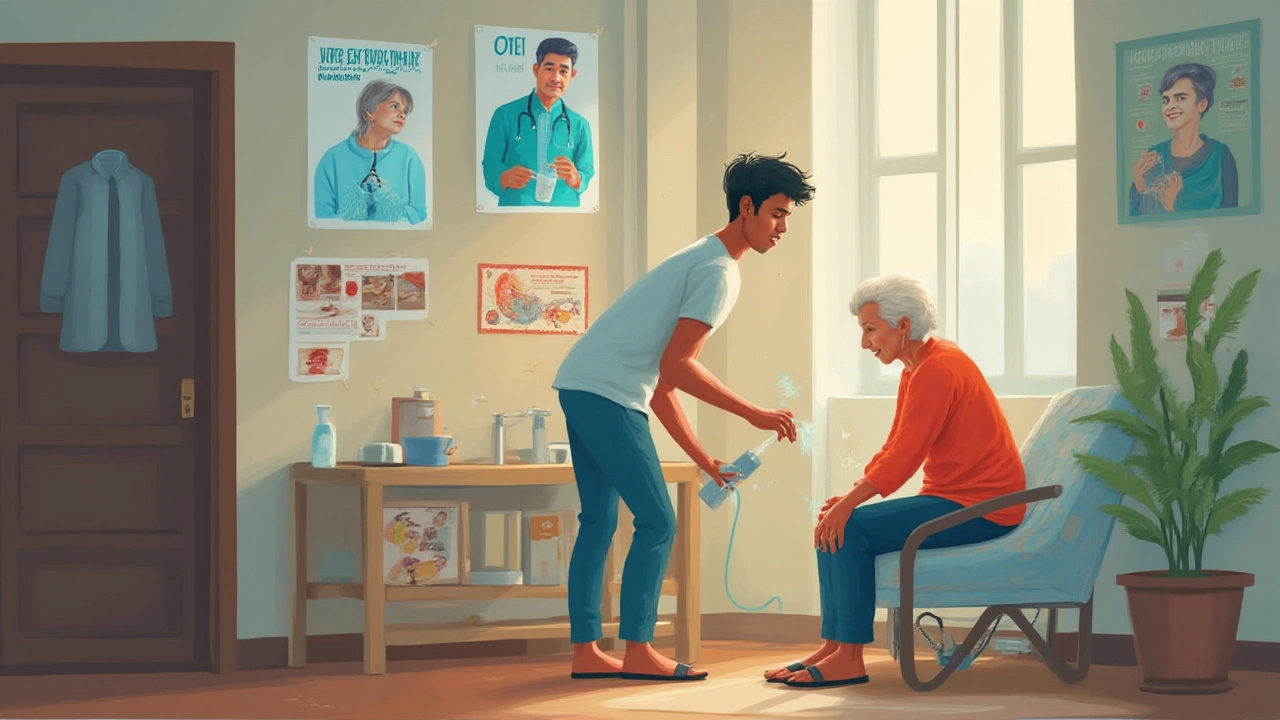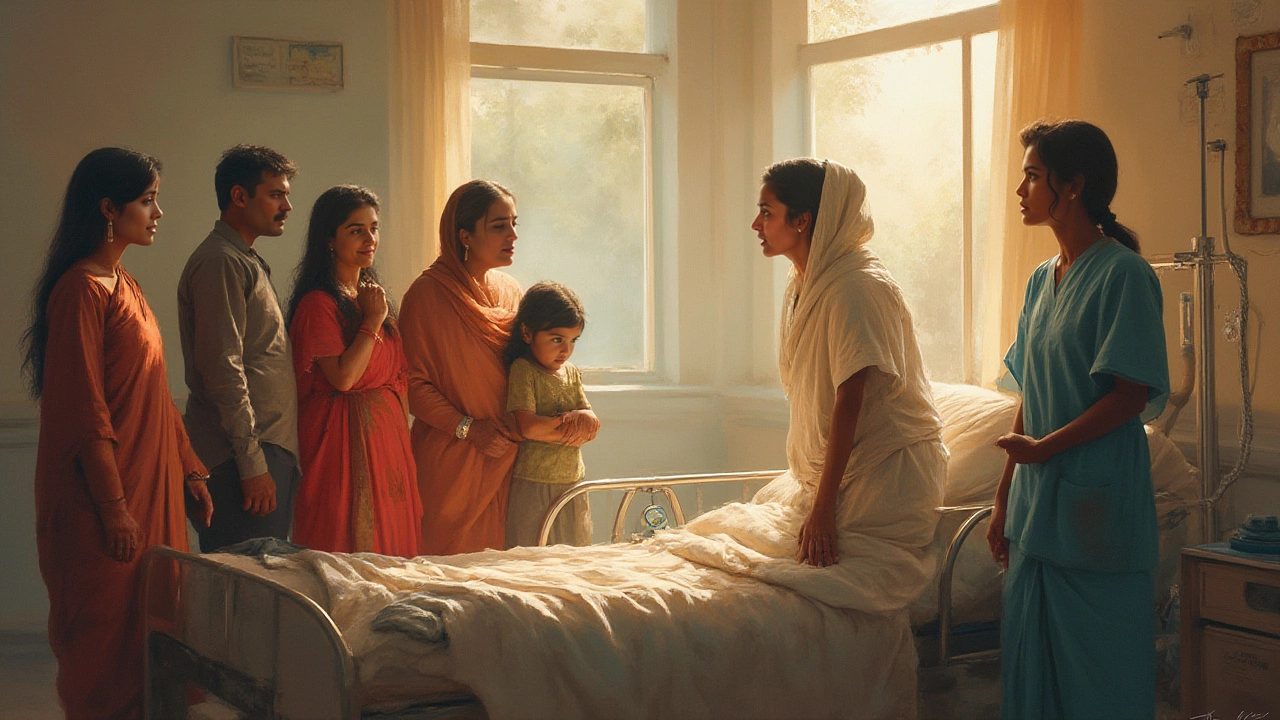Picture this: your best friend just started chemotherapy, and you want nothing more than to hug them or simply hold their hand. Maybe you’ve heard not to touch someone going through chemo because it could be dangerous. Sounds dramatic, right? The truth is, this idea isn’t as black and white as it seems, and there’s a lot more to understand about caring for someone on chemo than just keeping your hands to yourself.
Where Did the 'Don't Touch Chemo Patients' Idea Come From?
Ever wondered why people tiptoe around patients getting chemotherapy? It’s not just old wives’ tales—some of it comes from Hollywood, some from half-remembered warnings at the hospital, and a lot from concern for both the patient and their friends. Chemotherapy is a heavy hitter, designed to destroy cancer cells, but while it’s at work, it wipes out a lot of the body’s good cells too. The big worry is actually about infection risk, not radioactivity or any contagious effect from the person receiving the therapy.
Chemo makes people vulnerable. It’s the immune system that takes a hit; white blood cell counts plunge, making it hard to fight off even the most harmless germs. A common misconception is that chemo turns people themselves 'toxic.' That’s not quite how it works—but there are safety rules, especially for immediate caregivers or partners, who may come into contact with body fluids (like urine or vomit) in the days after treatment. Simple touch, though, if you’re healthy? It’s not a danger to you or them, provided you follow some sensible hygiene habits.
| Key Statistic | Fact |
|---|---|
| Reduction in Infection-Fighting Cells | Up to a 70% decrease in neutrophils within one week of chemo |
| Main Route of Chemo Drug Exposure | Direct contact with body fluids within 48 hours post-treatment |
| Common Chemo Side Effect | Immunosuppression (lowered immune defenses) |
Remember when Anjali, my wife, helped her aunt through chemo last year? The first instinct was to avoid hugs or kisses, just in case. But after learning more, she realized it was much more about being careful if you’re feeling sick yourself—don’t bring your cold to a vulnerable person.
Understanding the Real Risks: Infection Over Contamination
The biggest thing to worry about when you’re with someone undergoing chemo: bringing in germs. The chemo patient’s immune system, specifically the white blood cells called neutrophils, is often at an all-time low, leaving them exposed to infections even from harmless sources. Usually, the 'neutropenic phase'—when infection risk peaks—hits about 7-12 days after the start of a chemo cycle. During this window, tiny things like a sneeze, handshake, or even a little scratch could mean nasty consequences for them.
This isn’t about you catching anything from them. Chemotherapy drugs aren’t contagious, and skin-to-skin contact won’t harm you as a visitor. The drug does circulate through their body, yes, but it won’t leap through the skin. The one main exception: if you’re cleaning up body fluids (urine, vomit, sweat) within a couple of days post-infusion, you should use gloves—many hospitals give family members precise safety instructions just for that.
Here’s how I broke it down for my cousin when he visited his friend going through chemo: wash your hands when you come in, skip the visit if you’re sick, and no need to suit up like a hazmat worker. But go easy with big crowds, and try not to hug if you’ve got any hint of illness. If your friend wants a fist-bump or a hug, and you’re healthy, it’s usually fine.
According to the Dana-Farber Cancer Institute, "Protecting the immune systems of patients undergoing chemotherapy means limiting germ exposure, not limiting physical affection from healthy friends."
"Close contact is safe as long as you follow proper hygiene and aren’t ill yourself. Emotional support is just as vital as physical precautions." – Dr. Michelle Liu, Dana-Farber Cancer Institute

What About Chemo Drugs: Are They Dangerous to Others on Skin Contact?
This is the part that freaks a lot of people out. Chemotherapy medications are powerful, and hospitals treat them with a lot of respect—pharmacists and nurses wear gloves and sometimes masks when handling them. But does that mean you can ‘catch chemo’ from a patient’s skin? Not likely, unless you’re literally coming in touch with fresh drug residues or their body fluids right after an infusion.
The truth is, most chemo drugs are processed by the patient and cleared from the body within 2–7 days, mostly in urine or stool. Healthcare staff are careful because they handle concentrated forms of these drugs, not because a handshake with a patient could dose you. If you’re living with someone going through chemo, there are a few moments of higher risk—like cleaning soiled linens or helping them in the bathroom shortly after a treatment. Wearing gloves and washing up after takes care of that risk. This isn’t about casual contact; it’s about exposure to fluids.
- Bodily fluids including blood, urine, vomit, and stool may contain tiny amounts of chemotherapy drugs for up to 48 hours after a session.
- If someone is caring closely for a chemo patient, they should wear gloves and wash hands thoroughly, as advised by cancer centers across the world.
- Shared household items like utensils or plates are not a risk—they don’t transmit chemo drugs.
Most oncologists agree: the emotional support you give through touch, words, or presence outweighs most imagined risks. Everyone—kids hug their parents, partners sleep in the same bed, and family pets curl up as usual. Except: if you’re pregnant, super cautious is smart, and always ask the specific doctor for advice on handling fluids just after sessions.
Debunking Common Myths About Touch and Chemo
This topic is loaded with myths. Maybe you’ve heard someone whisper, 'Don’t touch them, you’ll get sick!' or worry about sitting too close. Reality: chemo doesn’t make someone radioactive, contagious, or untouchable. The "toxic touch" myth probably started because early cancer treatments, like radiation, were often misunderstood. Chemotherapy is chemical, not radioactive.
Fact-check: there are zero cases in medical literature of anyone falling ill from casual touch with a chemo patient. The real risk is the other way around; someone on chemo could get sick from exposure to everyday germs we carry around. It’s easy to get stuck in panic when a loved one’s health is fragile, but washing your hands and avoiding visits when you’re unwell knocks out 99% of the practical dangers.
Another classic worry: can pets give infections to chemo patients? Sure, but only if the pet is actively ill or bringing in dirt. The American Cancer Society reassures families that gentle pet contact is fine provided the animal is healthy and well-cared-for.
“A healthy dog or cat can stay close to someone going through chemo, as long as you help keep things clean and safe. The love matters, the germs usually don’t.” – ACS Patient Guide
Here’s a wildcard: there is an exception for some bone marrow transplant patients or those who’ve undergone special types of chemo. They might have stricter no-contact periods. Always, always check the care team’s written advice.

How to Safely Support and Care for Chemo Patients
Physical touch is powerful—sometimes it’s the best medicine. If you’re wondering how to support someone on chemo without causing harm, think more about germs than transferring drugs. Ask them what feels good for them—a lot of folks want a hug, a hand squeeze, or even just to be in the same room without masks or gloves between you.
- Wash your hands before visits and ask if they’d like physical contact.
- Skip visits if you have any sign of illness—even a mild sniffle.
- Wear gloves if you’re helping with cleaning up any body fluids within two days of treatment.
- Don’t share personal care products like razors, toothbrushes, or towels during the treatment window.
- If you have kids, remind them to be gentle and clean up before visiting.
- Keep the patient’s living space tidy but avoid harsh cleaners with strong fumes, since some folks get extra sensitive to smells.
- Pets are okay as long as both the animal and the environment are healthy.
- Use a mask if you’ve been exposed to something contagious, like the flu or COVID-19, and don’t risk it if you’re showing symptoms.
- Let the patient set the pace—they know their own energy better than anyone.
The importance of chemo patient safety can’t be overstated, but don’t let caution rob your loved one of comfort and connection. When Anjali’s aunt was deep into her chemo rounds, nothing boosted her spirits like a regular hand massage or just sitting together binge-watching a favorite show. She told us afterward that the hardest part wasn’t the chemo—it was feeling alone because friends and family were worried about ‘hurting’ her. Turns out, human warmth matters as much as medicine.
If you’re ever unsure, call the doctor’s office. Nobody expects you to memorize every guideline, and caregiving is as much about kindness as it is about safety.
